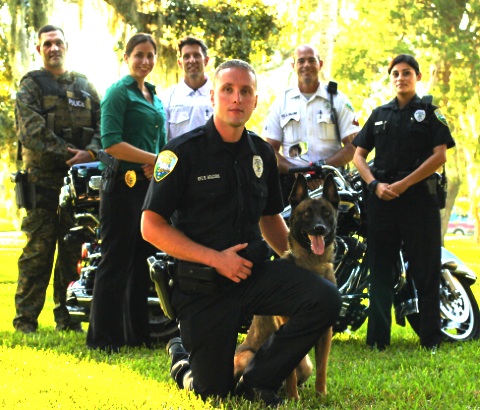
Crackdown encouraged by Mayor Adam Barringer, no stranger to being pulled over for speeding, running stop signs

 Photos for Headline Surfer® /
Photos for Headline Surfer® / NEW SMYRNA BEACH -- The cops in New Smyrna Beach are doing everything they can to get the word out: "Don't text and drive."
The New Smyrna Beach Police Department is joining national law enforcement personnel beginning today and continuing through Tuesday -- to crack down on motorists who text while driving.
It's part of the national "U Drive. U Text. U Pay." high-visibility enforcement campaign that combines periods of intense enforcement of anti-texting laws with advertising and media outreach to let people know about the enforcement and convince them to obey the law.
“People need to know that we are serious about stopping this deadly behavior,” Police Chief George Markert told Headline Surfer®. “Driving and texting has reached epidemic levels and enforcement of our state texting law is part of the cure.”
Violating Florida’s texting law, which took effect Oct. 1, can be costly. F.S.S 316.305 “Florida Ban on Texting While Driving Law” is punishable as a non-moving violation with a fine of $116 for the first offense.
The University of Michigan’s Transportation Research Institute reports that a quarter of teens respond to a text message once or more every time they drive, and 20 percent of teens and 10 percent of parents admit that they have extended, multi-message text conversations while driving.
“When you text while driving, you take your eyes off the road, hands off the wheel and mind off the task of driving,” said New Smyrna Beach Mayor Adam Barringer, himself no stranger to traffic-related offenses, and well known to New Smyrna Beach cops who have issued several verbal warnings to him either for running stop signs or speeding on the beachside late at night leaving his restaurant over the past five years. “That puts everyone else’s lives in danger. Each of us needs to be more responsible than that.”
“When you text while driving, you take your eyes off the road, hands off the wheel and mind off the task of driving,” said New Smyrna Beach Mayor Adam Barringer, himself no stranger to traffic-related offenses, and well known to New Smyrna Beach cops who have issued several verbal warnings to him either for running stop signs or speeding on the beachside late at night leaving his restaurant over the past five years. “That puts everyone else’s lives in danger. Each of us needs to be more responsible than that.”
According to the U.S. Department of Transportation, the agency promoting the national crackdown, the successes of the "Click It or Ticket" and "Drive Sober or Get Pulled Over" campaigns have proven that the combination of tough laws, targeted advertising, and high-visibility enforcement can change people’s risky traffic safety behaviors.
This strategy was implemented as part of the "Phone in One Hand, Ticket in the Other" distraction demonstration effort in Hartford, Conn., and Syracuse, NY, respectively. In both projects, texting (and cell phone use) declined dramatically. Based on these encouraging results, police agencies like New Smyrna Beach's have adopted the "U Drive. U Text. U Pay." campaign.
States like Florida that applied and that have primary enforcement of their text messaging laws were awarded approximately $8 million in grant funding from the U.S. Department of Transportation to support this and other efforts designed to fight distracted driving.
The "U Text. U Drive. U Pay." enforcement blitz also is supported by an $8.5-million national advertising campaign designed to raise awareness about the enforcement effort and remind people about the deadly consequences of driving and texting.
“We’re serious about enforcing texting laws,” New Smyrna Beach's Chief Markert emphasized, while warning, “If you drive and text, you will pay.”
For more information, on the anti-texting while driving initiatives, please visit www.distraction.gov. 
FAST FACTS: Distraction-affected crashes
There were 3,328 texting while driving incidents in 2012 nationwide that resulted in 3,328 deaths and injuries to another 421,000 people.
